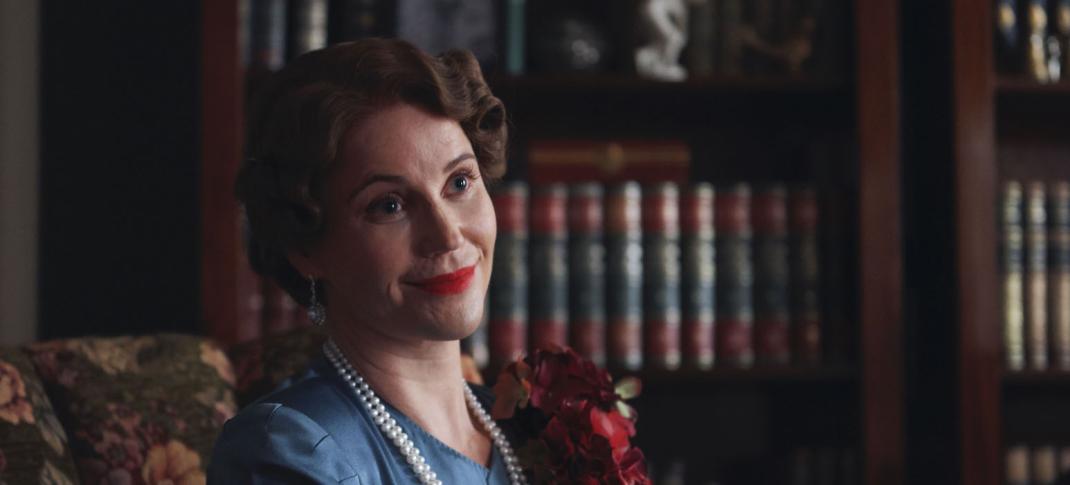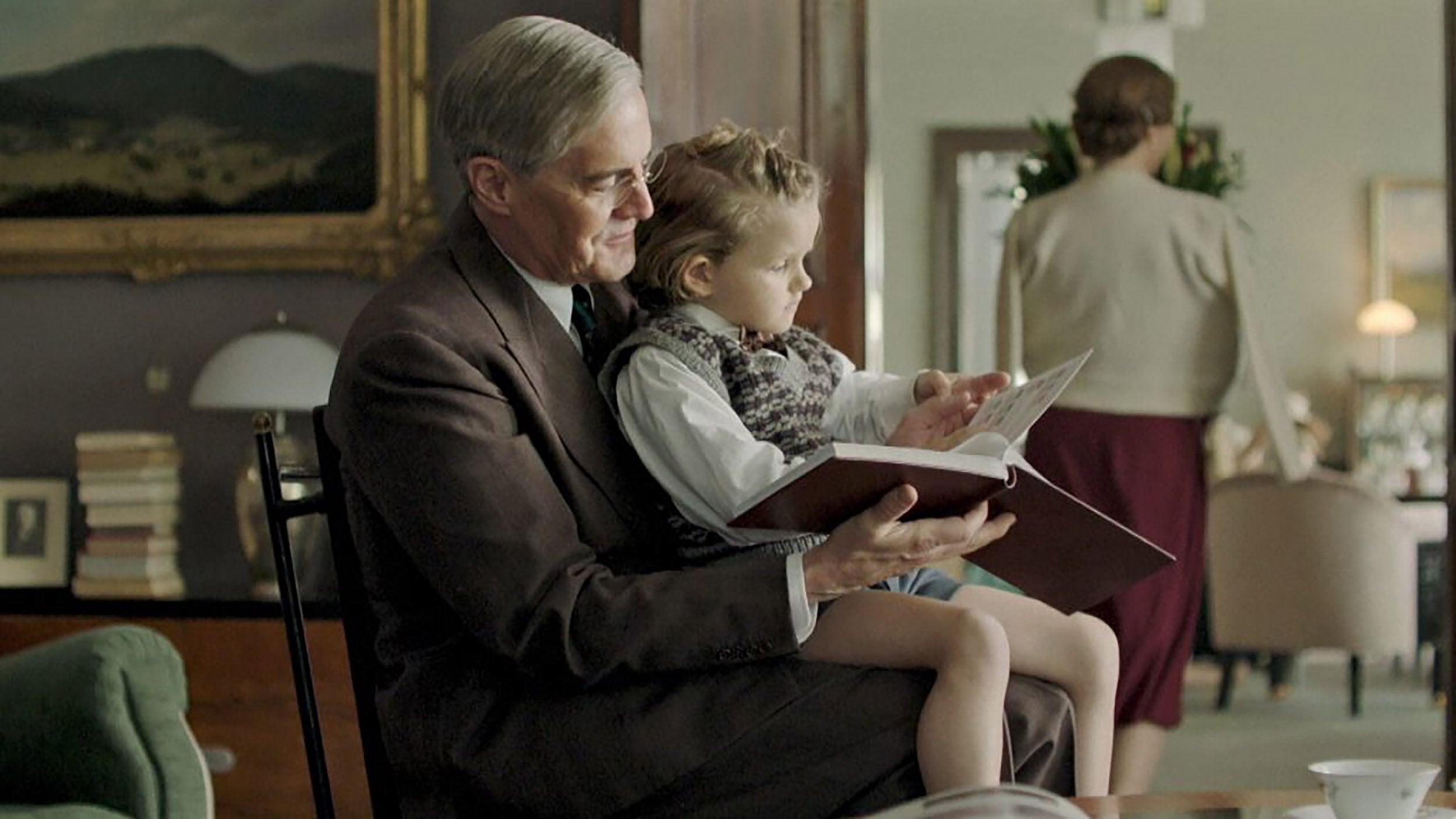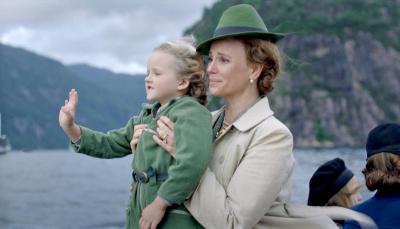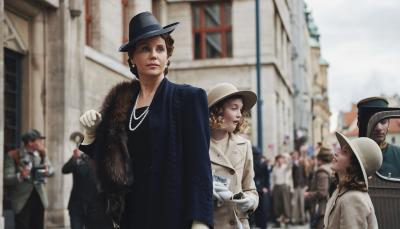Märtha Steps Up as Her Country's Advocate in 'Atlantic Crossing'

Sofia Helin as Crown Princess Martha in 'Atlantic Crossing'
Julie Vrabelova/Masterpiece
The fourth episode of Atlantic Crossing begins as the previous one did: in the White House pool. But this time, Roosevelt swims alone, and we hear his musings on how his life, and his control over it, have been changed. But as the monologue continues, as the President dresses, Missy assists with his calipers, and he’s helped to a podium, we realize that the personal and public personae blend as he addresses the press. It’s an election year, and America wants to hear that there will be no war. But it reminds us that Roosevelt’s finely tuned political instincts, despite his affection for Märtha and her family, may not bode well for Norway’s future.
Märtha, meanwhile, is unpacking at her new house with her children. Ambassador Morgenstierne has arranged for Märtha to speak at the Norwegian Seamen’s Church, and her fear of public speaking is in evidence. She paces nervously, and the Ambassador hands her a script with a few changes he’s made — a few essential improvements, he says, but it disconcerts her, as does the glowering, heavyset man in the second row.
Her nerves get the best of her before she’s barely read a word. As she and Ragni leave the church, the Ambassador presents her with a bouquet and asks her to set up a meeting with Roosevelt. Märtha demurs, telling him that the President has already been so generous to her and that she can’t get involved in politics. Morgenstierne is frustrated as she returns to the soothing world of furnishing her house, even telling the seamstress making the curtains that she wants them made in a length that may be unfashionable here but will work in her Norwegian house.
Roosevelt arrives on a surprise visit with a massive bunch of flowers and is greeted with great affection by the family. The children now address him as “godfather.” Märtha shows him the most recent additions to a photograph album, the last roll of film she shot in Norway, which she’s only recently developed. Roosevelt is warm and sympathetic. She asks him how his campaign is progressing. He admits that he’s running again because of the war and his fear of what would happen if his opponent, Wendell Willkie, a man who knows nothing of politics, took office. Märtha sympathizes with Roosevelt’s reluctance for a third term and asks him what he would do if he weren’t President.
He asks her what she’d do if she wasn’t to be the future queen. But before she can reply, the moment is broken by a phone call. It’s Olav urging her to set up a meeting with Roosevelt and Ambassador Morgenstierne, and it’s a rather short, curt call.
She finds Roosevelt with the children, preparing to leave. As they say their goodbyes, he tells her how wonderful and relaxing it is to be with someone who has no hidden agenda and assures her that if there’s anything she needs, just ask. Märtha jumps right in and asks if he’ll meet Morgenstierne. Roosevelt is taken by surprise and refuses, telling Märtha he is besieged by ambassadors wanting him to break the Neutrality Act, and he won’t. It’s politics, he tells her, it’s a game, but Märtha reminds him that invasion and exile is not a game.
Morgenstierne is clearly disappointed and contemptuous of Märtha’s effort, reminding her that, yes, he is the Ambassador of a small country, but she represents that country too. Ouch. Humiliatingly, he shows her the door.
Each in their separate spaces, Roosevelt, Märtha, and Olav follow the broadcast election results (in the White House, Eleanor, Missie, and Harry Hopkins listen together in a separate room). Märtha learns the next morning that Roosevelt has won, and she asks Ragni to remove the flowers he brought on his last visit. Once again, we see Roosevelt’s morning routine as Missie helps him dress and attach the calipers. We see a newsreel clip of the Presidential motorcade and, finally, the President alone in the Oval Office.
But Märtha swallows her pride enough to visit the Norwegian Seamen’s Church again, this time taking her children. The man who glared at her during her short-lived attempt at a speech is there as the congregation chats, and she realizes he’s in a wheelchair. So do her children, who immediately start asking questions about why he has no legs. The minister fills Märtha in: Alfred Isaksen (Fridtjov Såheim) was a sailor on a ship that was torpedoed, one of four that sank. He hasn’t seen his family for months.
Märtha approaches Alfred to introduce herself and offer her sympathy. But she gets an earful. Yes, he knows who she is, and he’s not pleased to meet her. Märtha finds herself standing alone in the room as Alfred is rolled away, and when she returns home, she reads a newspaper article about the continued destruction of Allied convoys. She is no longer interested in decisions about curtains. Now, she has a new purpose.
First, she visits Alfred at the Naval Hospital. Although he ignores her at first, she tells him, with great compassion and gentleness, that she understands his anger. She has used her connections to find where his family is now living and brings him news that they are all well and send their love. He weeps and thanks her. America, he tells her, is now Norway’s only hope.
The next stop on the agenda is an unscheduled visit to Ambassador Morgenstierne, whom she asks to role-play a meeting with Roosevelt. Hilariously, she takes the role of Roosevelt, and Morgenstierne has no option but to play along despite his embarrassment (at least he’s able to close the door on his secretary, who’s enjoying the scene). We learn that although the Norwegian gold reserves are in the U.S., the Neutrality Act presents them being used, but there may be a workaround.
Next, the White House (incidentally, Märtha’s wearing the most adorable hat so far in the series), where she barges into the Oval Office. She asks Eleanor to stay and begins by breaking one of the unbreakable rules of the White House — she refers to Roosevelt’s disability and the sacrifices he’s had to make. She’s also learned that the U.S. had provided battleships to the British and asked Roosevelt to do the same for Norway. He tries to dismiss it, saying the ships were old junk that were going to be scrapped, but Märtha persists.
She recounts the story of the fire in their house in Norway and how the neighbors rallied to help put it out. It was the kind thing to do, but also the smart thing because fire spreads. Europe is on fire. It is Roosevelt’s duty, his responsibility, to do the right thing. Eleanor is not pleased. As soon as Märtha has left, she turns on Roosevelt and warns him not to get any funny ideas, and that includes Märtha as much as the Neutrality Act.
It’s almost Christmas, and to Märtha’s surprise and delight, Olav shows up at her house. Their reunion is quite lovely—these are two people who love each other passionately and have a lot of lost time to make up. But Olav isn’t there to stay. His father needs him in England. Olav’s adjutant, Nikolai, has traveled with him and has his own reunion with his wife, Ragni. Squeezed together into a tiny narrow bed, he first shares a letter from their teenage children, Ulla and Rolf, who were left behind in Norway (finally! They’re safe and well). Whatever they have in mind next, Ragni points out that their youngest child, Einar, is fast asleep at their feet.
The next morning, Olav and Nikolai make their official arrival in time to help decorate the tree, to the children’s delight. It’s Christmas Eve, and they’ve been invited to the White House, which is full of Roosevelt’s grandchildren. Eleanor announces that they will observe the Norwegian tradition of opening gifts on Christmas Eve. Roosevelt has a very special present for Astrid and Ragnhild—a puppy!
Before it all gets too Hallmark-y, though, the adults gather to hear Roosevelt’s announcement to them of a new bill designed to protect America by protecting the Allies, which will not challenge the Neutrality Act. The Lend-Lease Bill will do as it says — lend or lease armaments. He jokingly makes it very clear that it’s his prerogative to introduce politics at a holiday gathering, despite the waves of disapproval coming from Eleanor and Missy.
But after Olav and Märtha leave, Eleanor has it out with Roosevelt. She, Missy, and Roosevelt’s right-hand man, Harry Hopkins, are furious with him. He won the election by promising that America would not go to war, but this surely brought them a step closer. Roosevelt insists that his actions are based on logic, not emotion or lust. It’s not even about doing the right thing (as Märtha suggested, doing the right thing may be against the will of the people); it is a question of doing what is necessary. At his next press conference, he uses Märtha’s example of the burning house, with his embellishments: 'You wouldn’t offer to sell your neighbor your $15 hose; you’d lend it.'
But an angry crowd watching the broadcast on televisions in a shop window won’t buy it. Olav and Märtha, walking by, see the crowd turn ugly, and a stone thrown through the window. They hurry away as the crowd chants, “America First!”
It’s great to see Märtha come into her own and argue her case with passion and eloquence. Although she was expected to set up a meeting with Roosevelt, she had no power as a go-between and was blamed when things went wrong. This episode also brings into relief the extraordinary dysfunction of the Presidential household and the secrets and intimacies between Roosevelt, Eleanor, and Missy. Now it's just a question of how to convince the American voters to also get on board with the lend-lease bill.
This post was originally published April 2021. Updated 7.6.2025
Atlantic Crossing continues on Sundays at 10 p.m. ET on most PBS stations, the PBS app, and the PBS Masterpiece channel, and will air and stream weekly through the end of July. All eight episodes are available as a binge for PBS Passport members. As always, check your local streaming service/listings.









